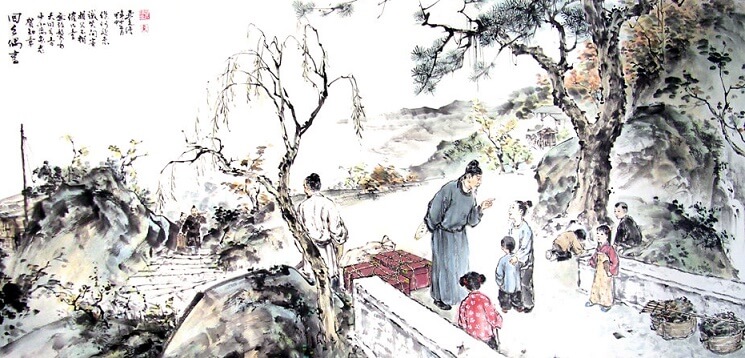Coming Home ( Returning Home )
- Poetry of He Zhizhang

I left home young. I return old;
Speaking as then, but with hair grown thin;
And my children, meeting me, do not know me.
They smile and say: "Stranger, where do you come from?"
Seven-character-quatrain
He returned home to his native village where he lived briefly before dying. Presumably, he wrote this poem in the brief time that remained to him.
One of his most famous works, He Zhizhang addresses his emotions towards returning home. As a politician who was elevated to the rank of a noble, He pleaded to retire from his position and return home at the age of 85. Upon reading the poem, readers immediately sense a sense of nostalgia and sorrow for the time the narrator has spent away from home. However, even though He has left his hometown for quite a long time, his native town still remains a priority in his heart: although his body, especially his 鬓毛衰 (grayed temple hair), have succumbed to the pressure of time, his 乡音 (village accent) has withstood its test. The most poignant of emotions is expressed in the last two lines, when He reveals the stark contrast in age between him and village children — although he shares their accent, they treat him as a foreigner. Their innocent question strikes at the heart of readers and evokes the common sense of a longing for home.
少小离家老大回,乡音无改鬓毛衰。
儿童相见不相识,笑问客从何处来。
- Why Chinese poems is so special?
- The most distinctive features of Chinese poetry are: concision- many poems are only four lines, and few are much longer than eight; ambiguity- number, tense and parts of speech are often undetermined, creating particularly rich interpretative possibilities; and structure- most poems follow quite strict formal patterns which have beauty in themselves as well as highlighting meaningful contrasts.
- How to read a Chinese poem?
- Like an English poem, but more so. Everything is there for a reason, so try to find that reason. Think about all the possible connotations, and be aware of the different possibilities of number and tense. Look for contrasts: within lines, between the lines of each couplet and between successive couplets. Above all, don't worry about what the poet meant- find your meaning.
- Seven Poems on Kaiyuan Era: Dancing Horses
- Midnight Song of the Four Seasons: Summer
- In Reply to Pimei’s Poem Written During Illness
- Ten Odes on Tea Utensils: Tea Vale White Lotus
- Spring Thoughts II
- The Arcane Celadon of Yue Kiln
- Lodging by Riverside Tower
- Along the River for Flowers Alone I
- The Cottage by the Stream
- The Lotus-Gathering Song